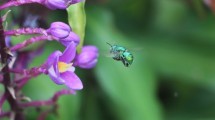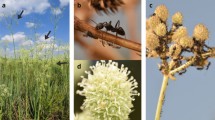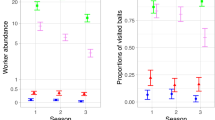Abstract
Primates are great fruit consumers and disperse intact seeds from most of the plants they consume, but effective seed dispersal depends, amongst other factors, on handling behavior. Likewise, the treatment in gut and mouth may alter seed fate. Overall, frugivore and folivore-frugivore primates are recognized to provide beneficial gut treatment for Neotropical plant species, but this effect might be overlooked at species-specific levels. In this study, we assessed the role of the southern muriqui (Brachyteles arachnoides), an endangered and endemic primate living in restricted fragments of the Brazilian Atlantic Forest, on potential quality of seed dispersal of native plants. Our main goals were to understand the effect of seed ingestion by this large-bodied atelid on germination of defecated seeds and in seed recovery by offering wild fruits of native species to captive individuals. We found that seven out of nine plant species were defecated intact and were able to germinate. Of those seven, one species showed enhanced and another showed decreased germination potential after defecation, while three species germinated faster after being defecated. The remaining species showed no differences from control seeds. The two non-germinating species were heavily predated, and average seed recovery was lower than expected, suggesting high levels of seed predation. The largest species offered (Inga vulpina) showed the highest dispersal potential. Our data support an overall neutral or potentially positive role of southern muriquis in seed dispersal quality for seven out of nine Atlantic Forest plant species, highlighting these primates’ potential to produce an effective seed rain.

Similar content being viewed by others
References
Aguirre AC (1971) O mono Brachyteles arachnoides (E. Geoffroy): Situação atual da espécie no Brasil. Anais da Academia Brasileira de Ciências
Almeida-Neto M, Campassi F, Galetti M et al (2008) Vertebrate dispersal syndromes along the Atlantic Forest: broad-scale patterns and macroecological correlates. Glob Ecol Biogeogr 17:503–513. https://doi.org/10.1111/j.1466-8238.2008.00386.x
Andresen E, Arroyo-Rodríguez V, Ramos-Robles M (2018) Primate seed dispersal: old and new challenges. Int J Primatol 39:443–465. https://doi.org/10.1007/s10764-018-0024-z
Arroyo-Rodríguez V, Andresen E, Bravo SP, Stevenson PR (2015) Seed dispersal by howler monkeys: current knowledge, conservation implications, and future directions. In: Kowalewski M, Garber P, Cortés-Ortiz L, Urbani B, Youlatos D (eds) Howler monkeys developments in primatology: progress and prospects. Springer, New York, pp 111–139
Baskin C, Baskin J (2014) Ecology, biogeography, and evolution of dormancy and germination, 2nd edn. Academic Press, Oxford
Baskin CC, Thompson K, Baskin JM (2006) Mistakes in germination ecology and how to avoid them. Seed Sci Res 16:165–168. https://doi.org/10.1079/SSR2006247
Baskin JM, Baskin CC (2004) A classification system for seed dormancy. Seed Sci Res 14:1–16. https://doi.org/10.1079/SSR2003150
Bello C, Galetti M, Montan D et al (2017) Atlantic frugivory: a plant–frugivore interaction data set for the Atlantic Forest. Ecology 98:1729. https://doi.org/10.1002/ecy.1818
Bello C, Galetti M, Pizo MA et al (2015) Defaunation affects carbon storage in tropical forests. Sci Adv 1:e1501105. https://doi.org/10.1126/sciadv.1501105
Bewley JD, Black M (1994) Seeds: physiology of development and germination, 2nd edn. Plenum Press, New York
Bueno RS, Guevara R, Ribeiro MC et al (2013) Functional redundancy and complementarities of seed dispersal by the last Neotropical megafrugivores. PLoS ONE 8:e56252. https://doi.org/10.1371/journal.pone.0056252
Bufalo FS, Galetti M, Culot L (2016) Seed dispersal by primates and implications for the conservation of a biodiversity hotspot, the Atlantic Forest of South America. Int J Primatol 37:333–349. https://doi.org/10.1007/s10764-016-9903-3
Chang NC, Su HH, Lee LL (2016) Effects of dietary fiber on gut retention time in captive Macaca cyclopis, Macaca fascicularis, Hylobates lar, and Pongo pygmaeus and the germination of ingested seeds. Int J Primatol 37:671–687. https://doi.org/10.1007/s10764-016-9931-z
Chapman CA, Bonnell TR, Gogarten JF et al (2013) Are primates ecosystem engineers? Int J Primatol 34:1–14. https://doi.org/10.1007/s10764-012-9645-9
Chapman CA, Onderdonk DA (1998) Forests without primates: primate/plant codependency. Am J Primatol 45:127–141. 10.1002/(SICI)1098-2345(1998) 45:1<127:AID-AJP9>3.0.CO;2-Y
Chaves ÓM, Bicca-Marques JC, Chapman CA (2018) Quantity and quality of seed dispersal by a large arboreal frugivore in small and large Atlantic Forest fragments. PLoS ONE 13:4–6. https://doi.org/10.1371/journal.pone.0193660
Corlett RT, Lucas PW (1990) Alternative seed-handling strategies in primates: seed-spitting by long-tailed macaques (Macaca fascicularis). Oecologia 82:166–171. https://doi.org/10.1007/BF00323531
Culot L, Bello C, Batista JLF et al (2017) Synergistic effects of seed disperser and predator loss on recruitment success and long-term consequences for carbon stocks in tropical rainforests. Sci Rep 7:1–8. https://doi.org/10.1038/s41598-017-08222-4
Duron Q, Garcia-Iriarte O, Brescia F, Vidal E (2017) Comparative effects of native frugivores and introduced rodents on seed germination in New-Caledonian rainforest plants. Biol Invasions 19:351–363. https://doi.org/10.1007/s10530-016-1284-1
Eriksson O (2016) Evolution of angiosperm seed disperser mutualisms: the timing of origins and their consequences for coevolutionary interactions between angiosperms and frugivores. Biol Rev 91:168–186. https://doi.org/10.1111/brv.12164
Fleming TH, Kress WJ (2011) A brief history of fruits and frugivores. Acta Oecol 37:521–530. https://doi.org/10.1016/j.actao.2011.01.016
Fricke EC, Bender J, Rehm EM, Rogers HS (2019) Functional outcomes of mutualistic network interactions: a community-scale study of frugivore gut passage on germination. J Ecol 107:757–767. https://doi.org/10.1111/1365-2745.13108
Fuzessy LF, Cornelissen TG, Janson C, Silveira FAO (2016) How do primates affect seed germination? A meta-analysis of gut passage effects on Neotropical plants. Oikos 125:1069–1080. https://doi.org/10.1111/oik.02986
Fuzessy LF, Janson C, Silveira FAO (2018) Effects of seed size and frugivory degree on dispersal by Neotropical frugivores. Acta Oecol 93:41–47. https://doi.org/10.1016/j.actao.2018.10.004
Fuzessy LF, Janson CH, Silveira FAO (2017) How far do Neotropical primates disperse seeds? Am J Primatol 79:1–6. https://doi.org/10.1002/ajp.22659
Genrich CM, Mello MAR, Silveira FAO et al (2017) Duality of interaction outcomes in a plant–frugivore multilayer network. Oikos 126:361–368. https://doi.org/10.1111/oik.03825
Gómez JM, Verdú M (2012) Mutualism with plants drives primate diversification. Syst Biol 61:567–577. https://doi.org/10.1093/sysbio/syr127
González-Varo JP, Arroyo JM, Jordano P (2019) The timing of frugivore-mediated seed dispersal effectiveness. Mol Ecol 28:219–231. https://doi.org/10.1111/mec.14850
Hawes JE, Peres CA (2014) Ecological correlates of trophic status and frugivory in Neotropical primates. Oikos 123:365–377. https://doi.org/10.1111/j.1600-0706.2013.00745.x
Flora do Brasil 2020 em construção. Jardim Botânico do Rio de Janeiro. https://floradobrasil.jbrj.gov.br/. Accessed 30 Jan 2020
Jordano P (2000) Fruits and frugivory. In: Fenner M (ed) Seeds: the ecology of regeneration in plant communities, 2nd edn. CABI Publishing, Wallingford, pp 125–165
Liebsch D, Mikich SB (2009) Fenologia reprodutiva de espécies vegetais da Floresta Ombrófila Mista do Paraná, Brasil. Rev Bras Botânica 32:375–391. https://doi.org/10.1590/S0100-84042009000200016
Lugon AP, Boutefeu M, Bovy E et al (2017) Persistence of the effect of frugivore identity on post-dispersal seed fate: consequences for the assessment of functional redundancy. Biotropica 49:293–302. https://doi.org/10.1111/btp.12418
Martins MM (2006) Comparative seed dispersal effectiveness of sympatric Alouatta guariba and Brachyteles arachnoides in southeastern Brazil. Biotropica 38:57–63. https://doi.org/10.1111/j.1744-7429.2006.00100.x
Milton K (1984) Habitat, diet and activity patterns of free-ranging woolly spider monkeys (Brachyteles arachnoides E. Geoffroy 1806). Int J Primatol 5:491–514. https://doi.org/10.1007/BF02692271
Muñoz-Gallego R, Fedriani JM, Traveset A (2019) Non-native mammals are the main seed dispersers of the ancient Mediterranean palm Chamaerops humilis L. in the Balearic Islands: rescuers of a lost seed dispersal service? Front Ecol Evol 7:1–16. https://doi.org/10.3389/fevo.2019.00161
Oliveira-Silva LRB, Campêlo AC, Lima IMS et al (2018) Can a non-native primate be a potential seed disperser? A case study on Saimiri sciureus in Pernambuco State, Brazil. Folia Primatol 901:138–149. https://doi.org/10.1159/000486413
Peres CA, Emilio T, Schietti J et al (2016) Dispersal limitation induces long-term biomass collapse in overhunted Amazonian forests. Proc Natl Acad Sci 113:892–897. https://doi.org/10.1073/pnas.1516525113
Petre CA, Tagg N, Beudels-Jamar RC et al (2015) Western lowland gorilla seed dispersal: are seeds adapted to long gut retention times? Acta Oecol 67:59–65. https://doi.org/10.1016/j.actao.2015.06.003
R Core Team (2019) R: a language and environment for statistical computing. R Foundation for Statistical Computing, version 3.6.0. Vienna, Austria. https://www.R-project.org/
Robertson AW, Trass A, Ladley JJ, Kelly D (2006) Assessing the benefits of frugivory for seed germination: the importance of the deinhibition effect. Funct Ecol. https://doi.org/10.1111/j.1365-2435.2005.01057.x
Samuels IA, Levey DJ (2005) Effects of gut passage on seed germination: do experiments answer the questions they ask? Funct Ecol 19:365–368. https://doi.org/10.1111/j.1365-2435.2005.00973.x
Santos Neto RTM dos, Guevara R, Lopes MA (2018) Effects of sex, seed size and amount of dietary fiber on retention time of captive black howler monkeys. Mastozool Neotrop 25:107–114. 10.31687/saremmn.18.25.1.0.10.
Schupp EW, Jordano P, Gómez JM (2010) Seed dispersal effectiveness revisited: a conceptual review. New Phytol 188:333–353. https://doi.org/10.1111/j.1469-8137.2010.03402.x
Talebi M (2005) Factors affecting food choice of the endangered southern muriquis (Brachyteles arachnoides, Primates, E. Geoffroy 1806) in the Brazilian Atlantic Forest. Dissertation, University of Cambridge
Talebi M, Bastos A, Lee PC (2005) Diet of southern muriquis in continuous Brazilian Atlantic Forest. Int J Primatol 26:1175–1187. https://doi.org/10.1007/s10764-005-6463-3
Tarszisz E, Tomlinson S, Harrison ME et al (2018) Gardeners of the forest: effects of seed handling and ingestion by orangutans on germination success of peat forest plants. Biol J Linn Soc 123:125–134. https://doi.org/10.1093/biolinnean/blx133
Traveset A, Robertson AW, Rodríguez-Pérez J (2007) A review on the role of endozoochory in seed germination. In: Dennis A, Schupp E, Green R, Westcott D (eds) Seed dispersal: theory and its application in a changing world. CABI Publishing, Wallingford, pp 78–103
Traveset A, Verdú M (2002) A meta-analysis of the effect of gut treatment on seed germination. In: Levey DJ, Silva WR, Galetti M (eds) Seed dispersal and frugivory: ecology, evolution and conservation. CABI Publishing, Wallingford, pp 339–350
Vizentin-Bugoni J, Tarwater CE, Foster JT et al (2019) Structure, spatial dynamics, and stability of novel seed dispersal mutualistic networks in Hawai’i. Science 364:78–82. https://doi.org/10.1126/science.aau8751
Wickham H (2016) ggplot2: elegant graphics for data analysis. Springer-Verlag, New York
Wickham H (2007) Reshaping data with the reshape package. J Stat Softw 21:1–20
Wickham H, François R, Henry L, Müller K (2019) dplyr: a grammar of data manipulation. R package version 0.8.0.1. https://CRAN.R-project.org/package=dplyr. Acessed 13 May 2019
Wickham H, Henry L (2019) tidyr: easily tidy data with “spread()” and “gather()” functions. R package version 0.8.3. https://CRAN.R-project.org/package=tidyr. Acessed 13 May 2019
Zwolak R (2018) How intraspecific variation in seed-dispersing animals matters for plants. Biol Rev 93:897–913. https://doi.org/10.1111/brv.12377
Acknowledgements
We are thankful to Zoológico Municipal de Curitiba staff (Nancy M. S. Banevicius and special thanks to Marcelo Bonat), Katia Zuffelatto for providing Triphenyl Tetrazolium Chloride, and Alcides Conte Neto for helping with statistical analysis. In addition, we thank two anonymous reviewers for their constructive comments. E. M. Zanette thanks the International Primatological Society (IPS) and Sociedade Brasileira de Primatologia (SBPr) for presenting part of this work in the XXVIIth IPS Congress as winner of the Coimbra-Filho Travel Grant Award, supported by Margot Marsh Biodiversity Foundation, Primate Specialist Group (IUCN) and Primate Program from Global Wildlife Conservation.
Funding
L. F. Fuzessy received funding from Fundação de Amparo à Pesquisa do Estado de São Paulo (FAPESP #2017/07954-0 and #2018/06634-5).
Author information
Authors and Affiliations
Corresponding author
Ethics declarations
Conflict of interest
All authors declare no conflicts of interest.
Ethical approval
No direct contact with animals was conducted during this research. All applicable international, national, and/or institutional guidelines for the care and use of animals were followed.
Additional information
Publisher's Note
Springer Nature remains neutral with regard to jurisdictional claims in published maps and institutional affiliations.
Electronic supplementary material
Below is the link to the electronic supplementary material.
About this article
Cite this article
Zanette, E.M., Fuzessy, L.F., Hack, R.O.E. et al. Potential role in seed dispersal revealed by experimental trials with captive southern muriquis (Brachyteles arachnoides). Primates 61, 495–505 (2020). https://doi.org/10.1007/s10329-020-00796-4
Received:
Accepted:
Published:
Issue Date:
DOI: https://doi.org/10.1007/s10329-020-00796-4




